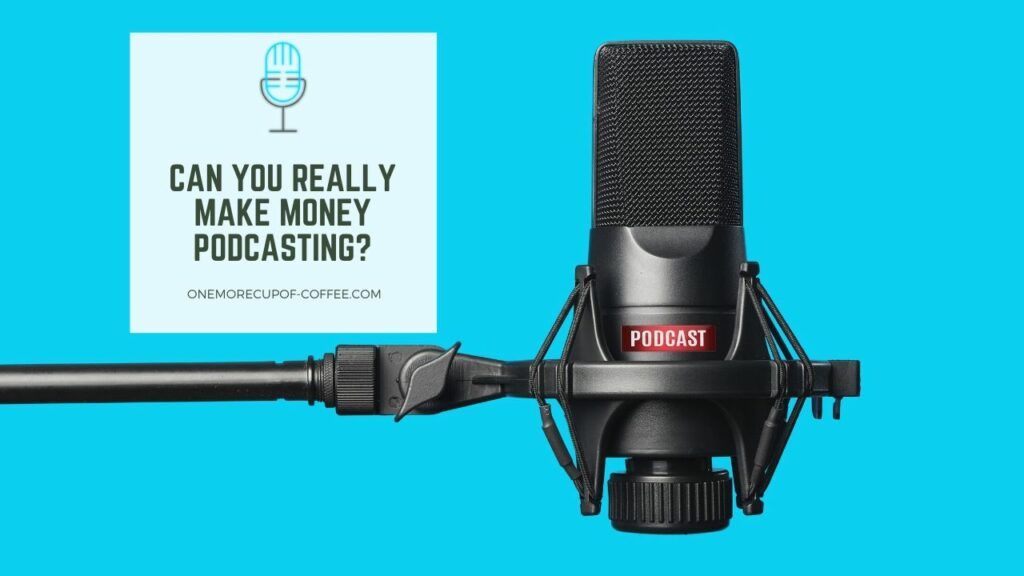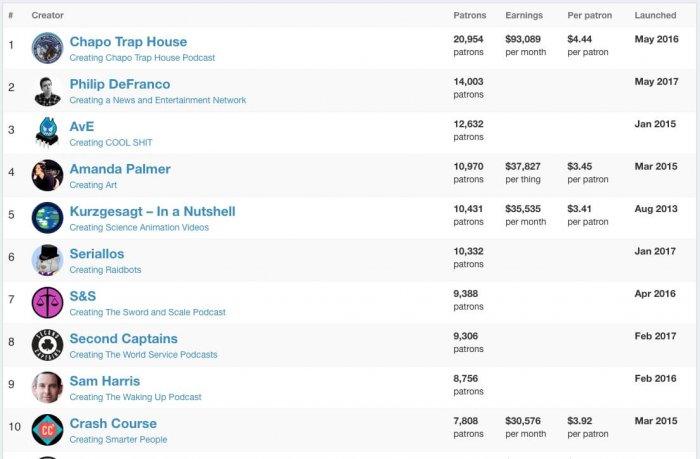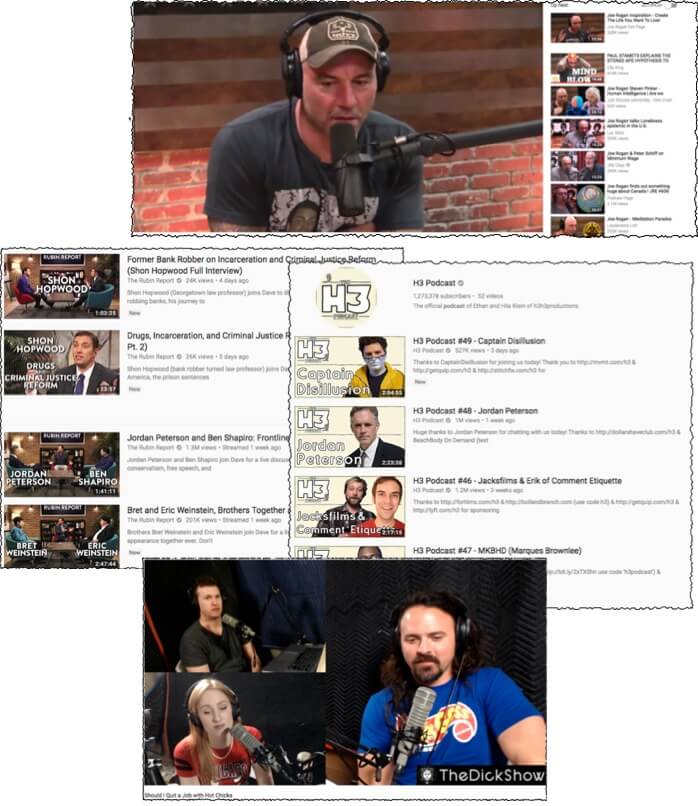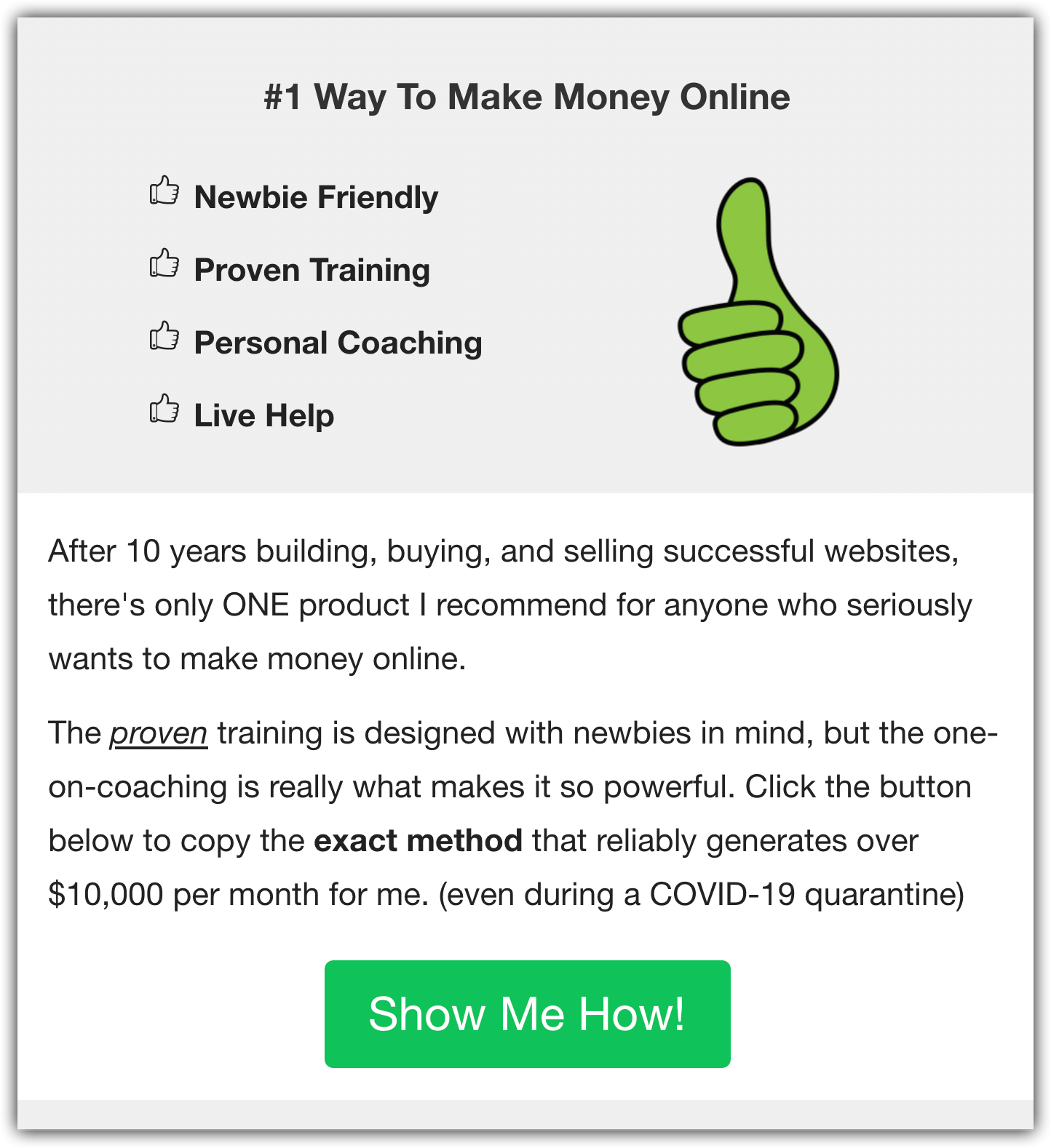
Starting your own podcast has never been easier. You only need basic equipment to begin and there are countless programs and tutorial that can help support you. Podcasts are also immensely popular and they can be fun too.

Are You Ready To Work Your Ass Off to Earn Your Lifestyle?
Are you tired of the daily grind? With a laptop and an internet connection I built a small website to generate income, and my life completely changed. Let me show you exactly how I’ve been doing it for more than 13 years.
It’s no wonder that so many people are turning to them as a way to earn some income. So, can you really make money podcasting? Or is the idea reserved for a select few who somehow land a huge audience?
Making Money Podcasting
The simple answer is yes, you can make money with a podcast. How much you make depends on more than how interesting your material is, so we’ll look into a few different monetization strategies and how to leverage each one to the fullest.
Methods of Monetization
The first aspect of deciphering how to generate income from your podcast should be obvious – the methods of monetization. These are the various income streams that podcasters use.
All of the approaches are valid and there are many successful examples in each case. Some podcasters choose to rely on a single option, while others use multiple. But, the right solution for you is going to depend on your topic, experience, and audience.

Sponsorships
Having sponsors is one of the easiest and natural ways to make money with podcasts. Sponsors simply pay you to promote their products (or services). There are countless different sponsors in many different fields. This makes it easy to find sponsors that are related to the topic of your podcast.
In many cases, you’re earning based CPM, which stands for cost per mille (French for 1,000) and translates to 1,000 listens. For example, if the CPM was $18 for a 15 second-ad, you could earn $180 if you had an audience of 10,000 listeners. But, you would just earn $18 for an audience of 1,000.
The CPM rates are based on where the ad is placed and the industry you’re operating in. For example, a 15-second pre-roll ad may be somewhere around $18 CPM, while a 60-second ad during the podcast itself may be around $25 CPM.
There are also some CPA sponsorships out there. These are cost per acquisition – and they’re basically a form of affiliate marketing.
With them, you earn based on sales you promote. Many such programs offer a flat fee per conversion, although some may give you a percentage profit instead. A conversion could count as any action, not necessarily a paid one.
For example, a service like Harry’s may give a free trial shave kit where they make $0, but you make $5. This is made possible since Harry’s is a subscription service and banks on a portion of the freebie crowd will convert to paying customers.

If your podcast is popular enough, you may find that sponsors come to you. You can also look for them yourself if you’re just getting started. Many sponsors will have specific requirements. These often focus on your traffic numbers and the topic of your podcast.
Alternatively, there are podcast networks that will accept most podcasters that apply. You’ve probably heard a Blue Apron or Me Undies ad on almost every podcast out there, so those would be a great place to start if you are searching for advertisers.
The networks typically provide a lower rate than independent sponsors, but the legwork is much lower as well. Some networks, like Wizzard Media, provide hybrid solutions. These allow podcasters to find their own sponsors, while still being sure they’ll have enough sponsorship to fill every slot that they need to.
The catch is that you need to be careful. Overpromoting products is a sure way to make people disinterested. This is especially true for ads that are before or during the podcast.
Charge For The Podcasts
Some creators choose to put a price on their work. There are various ways to do so. One style is to release some of your content for free and have members pay for the rest. Alternatively, you may have two shows, one paid and one free. This way people get interested in the show through the free content, and get excited about what’s behind the paywall.
This is a good way around having ads in your shows. But, you need high demand for it to work. After all, there are countless free podcasts out there.
You also need to use a service that supports paid podcasts. Traditional platforms like iTunes typically don’t. Patreon is a great way to leverage this method, as well as the “bonus” method discussed below. Although Patreon won’t send the material directly to the podcast app, it’s still an audio-format show that people can listen to through the Patreon App.
Dave Rubin does a unique model where he releases ad free versions of his podcast first on Patreon, then a week later for free on free podcasting apps. This means his diehard fans are willing to pay extra to get the new material before everyone else, and they won’t have to fast forward through the ads!

Charge Money For Bonus Episodes
A similar idea is to offer bonuses. For example, the podcast Never Not Funny has a Players Club that starts at $29.99 for one season (six months’ worth of shows). Membership provides a full video of all episodes, bonus podcasts, and exclusive content. This technique provides a way to charge without making free members feel like they’re being ripped off.
The Biggest Problem In The Universe was a great podcast that charged $1.99 for a bonus episode, once per month. After 4 episodes of amazing, free content, it was a pittance to ask $2 for bonus material.
With 10,000+ listeners, there were pulling in at least a couple thousand per bonus episode. While not enough to retire on, it was enough to keep the podcast running and look to the future for more business opportunities.
“Bonuses” could anything from more of the same material to unique things like exclusive interviews or fan Q&A.
Build A Brand
Building a name for yourself can be a way to sell products indirectly. For example, some people choose to create their own website and then use this to promote the podcast and other services. The site Manager Tools does precisely this. The podcasts are provided for free and they serve as a way to promote the services that Manager Tools is selling.
You don’t need to sell your own products or services either. For example, you might have a podcast about beer making or tasting, then use your website to promote the tools that you use.
Basically, you can use affiliate marketing on your site to focus on products that relate to your topic. You can even run ads on the site if you want.
This style also has a marketing advantage. It’s often easier to promote a website and get traffic to it than it is to get a podcast noticed. As such, your website can become a way to get people interested in your podcast. There are also various plugins that make it easy to get a podcast on your website.
Ask for Donations
If you’re running a podcast on your own website, you can easily install a donate button. Several different WordPress plugins do exactly that. Most are linked to PayPal, although some may support alternative payment providers or even Bitcoin.
Asking for donations on its own isn’t extremely effective. You won’t get a large amount of money that way. But, it can be a little extra money and it feels less intrusive than advertising.
You can also go a step further and use the site Patreon. This is designed as a way for creators to earn money, regardless of their field. Members typically pay monthly, which provides a predictable income source. It acts as a combination of asking for donations and charging for bonuses.
In particular, you get the chance to provide various rewards and incentives. For example, Wolf 359 creates something that is partly a podcast, partly a radio drama series.
Members that pay $1 or more per month get a monthly newsletter and those that $3 or more get insider club access. The higher tiers offer more impressive rewards, including monthly custom tutorial videos at $10 per month.
The style is more powerful than simply asking for donations, as people get something for their money. Patreon is also popular and well-respected, which means listeners will readily use it.
Leverage Relationships
Podcasts offer a way to build relationships with your audience and also with other people. For example, many podcasters regularly host interviews with people in their field. These interviews provide connections and networking opportunities. Some of these relationships will develop over time, especially if you end up interviewing the same people more than once.
Networking like this is a powerful way to create income opportunities. You may find chances for collaborations that you never even imagined at the beginning.
Virtual summits are one example of this. Some podcasters run digital conferences that bring together many experts in an industry. They then charge visitors to attend. Such events can be extremely popular and profitable. This all starts with creating relationships.
Those free relationships can turn into monetary ones down the future. Many authors will do a “podcast tour” to promote their book. Some of those definitely involve the author’s agent paying to be featured on the podcast to get more reach.
Wouldn’t you pay a few grand to reach 100 million listeners for 3 hours on the Joe Rogan Experience, possibly the most popular podcast in the world?
Doubling Down On Podcast Revenue With YouTube Clips
The income levels vary dramatically for podcasting. Some podcasters are barely breaking even, while others are operating at a loss. Some podcasters, like Wolf 359 mention that they’ve only just started to turn a profit and losing money beforehand.
After all, many of the most popular ones involve considerable time for research and rely on expensive equipment.
But, there are many success stories out there too. For example, The Rubin Report currently makes around $28,000 per month on Patreon alone. That doesn’t count any of their other sources of income like YouTube income from posting the video clips.
Posting video clips of shortened content sections is an excellent way to “reuse” your content on another platform and double-monetize the same episode. Featuring written commentary on your website with Adsense and affiliate links could create even more monetized traffic.
Successful podcaster also develops and refine their work overtime. Many of the most popular podcasts started out with a single podcaster and basic equipment. Some now have multiple full-time staff members, along with studios and high-tech equipment. These success stories show that podcasting can pay off in the long-term.

How To Be Successful Podcasting (From A Guy With A Failed Podcast)
Techniques for making money are important but they’re not the whole story. Instead, you need to spend time planning and researching. There are also some key approaches that can increase your odds of success.
Create High-Quality Content
Quality content is important in any field but it’s even more critical for podcasting. There is already a huge number of podcasts out there, with more being added daily.
Plus, audiences can’t skim a podcast like they can a blog post. As a result, people are very picky about the podcasts they listen to. If what you offer isn’t good enough, they’ll leave and they won’t come back.
There are multiple aspects to creating good content.
- Production and Audio Cleanup. First of all, your podcast must sound good. This includes avoiding background noise and making sure your voice is easy to hear at all times.
- Equipment. You don’t need the best equipment right from the beginning. In fact, the microphone on a smartphone is often good enough. But, as your audience increases, it’s worth looking at higher quality tools.
- Planning and research. Your content needs to be of high value. A podcast isn’t much use if it just says the same thing that dozens of other ones have said. Part of this involves figuring out what your audience is looking for and providing it. More than anything – think about why people should listen to your content. What value does it offer?
Why did my podcast fail? I didn’t do enough research. I thought of a topic, took some quick notes, and then just talked to myself for an hour. The audio quality was terrible, and the content was pretty boring, especially if you listened to each episode. I found myself rambling and repeating a lot of the same ideas.
Focus On Relationships
The best podcasts build relationships between the podcaster and the audience. This means treating them respectfully and engaging with them.
If your audience feels close to you and to your podcast, they’re much more likely to keep listening. Your chances of making sales increase as well.
You can also reach out to other people in your niche and attempt to get featured or have them featured on your show. Cross-promoting is a very popular way of sharing audiences and growing fast.
Why did my podcast fail? I never reached out to anyone. I was too embarrassed to share my own content and didn’t feel I had value to add to other podcasts.
Don’t Over-Commercialize
Many income methods for podcasting involve promoting a product or a sponsor. But, this is a double-edged sword. One the one hand, the promotion is often essential for earning money. But, too much promotion can stop people from listening. Sponsors may also be less willing to get involved in a heavily commercial podcast.
This is why the best podcasts provide value first and foremost. In fact, some of the most successful podcasts never even needed to pursue income. Sponsors came to them instead.
Why did my podcast fail? I focused too much on leveraging my podcast to get affiliate sales. That was the main reason for starting the podcast and looking back, it was quite obvious I didn’t have much to say except “sign up today!”.
Find A Niche
You can’t just create a podcast that’s about everything. No one will listen. Instead, you need to choose a topic that’s going to engage your audience and make people interested. For example, you might pick a trade or a hobby that you’re interested in. Craft beer, surfing, and cooking are some of the many different podcast themes out there, not to mention all of the comedy ones.
Some authors focus on an angle, rather than a specific topic. A prominent example is 99% Invisible, which is hugely popular. Each podcast is a detailed examination of the details, planning, and/or science that goes into a part of our world that we don’t notice.
There have been more than 200 episodes produced and many focus on areas that listeners would never have heard or thought about previously.
There are many other types of topics out there. Two other examples are The Strange and Unusual Podcast, along with The Hilarious World of Depression. The first is all about folklore, ghost stories, superstition, and the like, while the second is a show about depression from the perspective of comedians who suffer from it.
Regardless of the area you choose, you need something to focus your podcast on. This gives you a way to market it and to target an audience. Without a niche or angle, it becomes too difficult to get your podcast noticed.
Why did my podcast fail? Well, the topic was pretty focused I think – affiliate marketing – but I often rambled on about stocks, Tesla, or scams. I started with a good idea but never stuck with it.
Approach It Like A Business
To be successful in any business, you need to plan and research. This is true for podcasting too. You need to work out what direction you’re going to go in, who your audience is, and what they’re looking for.
You should also pay close attention to what works and what doesn’t, and be willing to change the format as audiences and technology changes.
Why did my podcast fail? My podcast was a chore starting from episode 2. I hated doing, editing, and listening to it. It lasted several months, but it was not fun at all.
Repurpose Content
One final trick is to repurpose content. Creating a podcast takes considerable time, energy, and research. But, you can use the information you gather in other ways as well. For example, you can create live videos on YouTube and/or build related content on a website.
Both avenues provide additional ways to engage with your audience and provide value. They also represent other income avenues. This makes them a great way to get more out of the work that you put in.
I actually did very well with this angle, often covering the same topic on the podcast and website in the same week, then shooting video for YouTube.
Is Podcasting A Good Way To Earn Consistent Income?
Like any field, podcasting is hard work. It takes time and energy to create podcasts, along with all of the research and planning that underpins it. But, if you’re passionate about the idea – then it really can work. With so many podcasts out there, you need something that is going to make you stand out.
That being said, yes, podcasting is very profitable and is just one of the hundreds of ways to make money online in the age of the internet. Have you started a podcast? Post the link in the comments and let us know what your experience is so far!
Make Money Podcasting
Newbie Friendly
Cheap To Start
Easy To Scale
Income Potential
Final Review
There are thousands of different side hustles you could do to earn some extra money on the side, and which one "clicks" for you depends on your personality and goals. However, there's one side hustle that makes an insane amount of money and works for anyone.
Starting an affiliate website is an incredible way to earn extra money because you can do it from your home on a laptop, and work on your business in the evenings and on weekends. The income potential is huge, and it's easy to scale

Nathaniell
What's up ladies and dudes! Great to finally meet you, and I hope you enjoyed this post. My name is Nathaniell and I'm the owner of One More Cup of Coffee. I started my first online business in 2010 promoting computer software and now I help newbies start their own businesses. Sign up for my #1 recommended training course and learn how to start your business for FREE!


 Can You Really Make Money Washing Cars?
Can You Really Make Money Washing Cars?



Kunal
As someone who is about to get started on the podcast journey (right after the Bar exam), this really spoke to me. Thanks for all the great information! I totally dig your website. Hey, maybe I can have YOU on my show someday!
Nathaniell
That would be awesome. Kunal. Looking forward to it!
Ian Bond
Good, helpful article, Thanks for the information
Tony W
I always believed that Podcasting was too much like a traditional job to consider. After reading about Joe Rogan’s numbers I am second thinking that line of thought. LOL
Nathaniell
No one can prove that’s what he makes, but as one of the most popular podcasts in the world he’s making bank. Have you see his new studio? It took him 10 years or something like that to build up enough momentum and money to build it, but it’s crazy. Has a full gym, sauna, electronic bow hunting, and more!